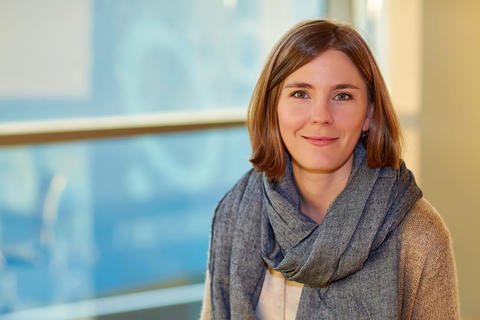Newsroom
News
Beatriz Martín García receives one of the 2025 Journal of Materials Chemistry Lectureship runner-up awards
Beatriz Martín García, Ikerbasque Research Fellow & Ramón y Cajal Fellow at CIC nanoGUNE, has been selected as one of the runners-up of the Journal of Materials Chemistry Lectureship 2025. This award recognizes her remarkable contributions to materials chemistry and the scientific community, as well as her leadership. At nanoGUNE, she leads a research line aimed at elucidating the interplay between the crystal structure, composition, and optical, electrical, and magnetic properties of low-dimensional materials to facilitate their integration into devices. To this end, she focuses on chemical design and uses dedicated spectroscopic techniques, particularly micro-Raman spectroscopy.
"NANOTECHNOLOGY PROMISES SIGNIFICANT ADVANCES IN MEDICINE"
Quantum Mile: a journey through quantum physics research in Donostia
Starting today, Donostia has a scientific-technological route that can be explored on foot or virtually. This outreach initiative, promoted by the Basque Government and involving CIC nanoGUNE along with six other centers, highlights and recognizes the Basque scientific leadership in quantum science and technologies.
AI helps decode how nature builds minerals
A new study led by Pablo Piaggi, Ikerbasque Research Fellow at CIC nanoGUNE, offers fresh insight into how nature forms minerals thanks to cutting-edge artificial intelligence. Published in the special issue Machine Learning in Chemistry of the Proceedings of the National Academy of Sciences (PNAS), the research demonstrates how machine learning models – AI systems that learn from data – can simulate complex chemical reactions essential to understanding biomineralization (the process by which organisms form minerals like shells and skeletons) and carbon sequestration, a key mechanism in mitigating climate change.
Sir John Pendry Awarded the Copley Medal by the Royal Society
Sir John Pendry, President of the International Advisory Committee of nanoGUNE since its inception, has received the prestigious Copley Medal by the Royal Society. This recognition, one of the oldest and most distinguished in the scientific field, highlights Prof. Pendry's exceptional contributions to science. Every year, Prof. Pendry visits nanoGUNE to participate in the annual Advisory Committee meeting, whose mission is to advise nanoGUNE’s management on the strategic direction the center should take.
Inauguration of IBM-Basque Country quantum computer in Donostia
The inauguration of IBM's quantum computer in Donostia marks a significant milestone in the advancement of quantum technology in the region. The event, presided over by Lehendakari Imanol Pradales, was attended by prominent figures from the scientific and technological fields, including nanoGUNE's Director General, Jose M. Pitarke, and Ainara Garcia Gallastegui, Director of Technology Transfer, who participated in the round table titled “Building the Global Quantum Ecosystem.”
Two-step excitation unlocks and steers exotic nanolight
“SCALABILITY IS THE NEXT BIG CHALLENGE OF QUANTUM TECHNOLOGIES"
Researchers demonstrate direction-dependent vibrational strong coupling at the nanoscale
Researchers from the Quantum Nano-Optics group at the University of Oviedo and the Center for Research on Nanomaterials and Nanotechnology (CINN-CSIC), in collaboration with the 2D Nanophotonics group at the Donostia International Physics Center (DIPC) and the Nanooptics group at CIC nanoGUNE, have observed, for the first time, vibrational strong coupling (VSC) between hyperbolic phonon polaritons in MoO₃ slabs and molecular vibrations of organic compounds.
"One focus will be the translation of Nanomedicine and Quantum Technologies to the market"
Agenda
| Mon | Tue | Wed | Thu | Fri | Sat | Sun |
|---|---|---|---|---|---|---|
|
26
|
27
|
28
|
29
|
30
|
31
|
1
|
|
|
|
|
|
|
|
|
|
2
|
3
|
7
|
8
|
|||
|
|
|
|
|
|||
|
9
|
10
|
11
|
12
|
13
|
14
|
15
|
|
|
|
|
|
|
|
|
|
16
|
17
|
18
|
19
|
21
|
22
|
|
|
|
|
|
|
|
|
|
|
23
|
24
|
25
|
26
|
27
|
28
|
1
|
|
|
|
|
|
|
|
|
Events
No events
nanoVISUALS
Find events' photos, experimental images, videos, audios, and nanoGUNE's corporate images.











